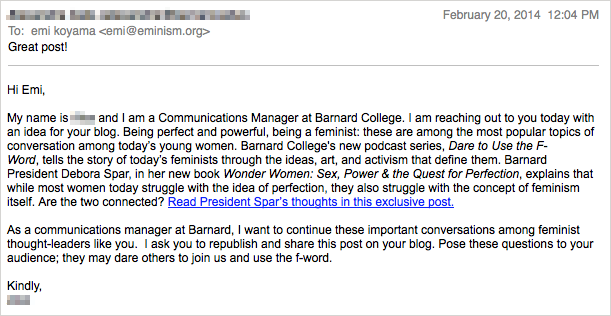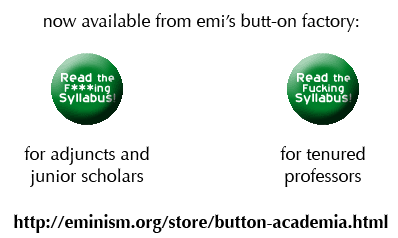A new school year has began, and I am asking for your help. If you are affiliated with a college or university, please try to get me invited to come and speak at your school.
It’s so simple to write that paragraph, but it was very difficult for me to write it, partly because of my own personal baggage (i.e. low self-esteem making me feel unworthy of help or invitation, difficulty asking for others’ help, etc.), but partly also because I don’t actually believe in this college speaker circuit. In fact, I think there is something deeply problematic about it.
Readers may not realize the extent to which the college speakers’ circuit has become an industry. I wasn’t either, until Nomy Lamm, a fellow activist, writer, artist and popular college speaker, told me about a trade show for college circuit speakers and performers. Apparently there are these industry “conventions” around the country several times a year, in which would-be speakers (self-identified motivational “gurus,” feel-good “diversity trainers,” semi-celebrities from reality shows, etc.) come to learn new buzzwords and marketing gimmicks. They also staff their booths in the exhibit hall as bored college administrators walk through, picking up brightly colored glossy brochures for their “services.” Inspirational! Energetic! Engaging! The promotional materials scream.
It’s easy to recognize that these college circuit speakers use buzzwords, exaggerated enthusiasm, and flashy colors because they have no substance. But these gimmicks work, in part because that is what college administrators are looking for: administrators often do not treat students like grownups. They often act as if students need to be constantly “inspired” and “energized” with oversimplified sloganeering, whether it is for personal growth or for revolution. (Oh, and by the way, if any administrator is reading this, I’m obviously not talking about you. I’m talking about some other administrator!)
I’m not one of these speakers. I don’t have a brochure or even press photo for myself; I just have a website and lots and lots of writings that tend to promote better understanding of complex realities in which we live, rather than offering simple solutions or positions that readers can click “like” in facebook and forget about. I know that I don’t inspire or energize majority of average American college students, because to do so I would have to betray those students who find the constant celebration of positivity and optimism (common theme among speakers who are considered “inspirational”) rather depressing.
I speak, primarily, to a narrow constituencies of students and others who find the ordinary campus life unbearable: queers and genderqueers who aren’t “getting better,” crips and gimps who are invisible, kids from immigrant or poor families who somehow went astray into weird academic departments like Women’s Studies and Ethnic Studies against their communities’ good sense, survivors who have trouble distinguishing campus from a war zone, students who do sex work to pay for the salary of professors who categorically deny their experiences. I was all of the above myself (and more), after all.
I do believe that my voice has something to contribute to the campus life, not just in the sense of validation and support for the students who fit the descriptions above, but also for others who need to be challenged and pushed further: that seems like an important part of college education for any student. But it is difficult for me to promote myself as a college speaker (outside of the formal structures of academia) when I know that the market is saturated with speakers who are better at promoting themselves, and especially when I feel so inadequate at doing what college administrators (again, not you–the other administrators!) expect speakers to do.
Another reason I resent the college speakers’ circuit is that it is hard to feel that my voice is worth the price I am charging. When I began speaking on college campuses years ago, I only asked for $200 because that seemed like a fair price for a gig involving travel. But I was treated very poorly by the administrators (and by some student organizers, when I was visiting elite schools) during my visit, which they did little to promote. Over time, I realized that people not only respect me and what I have to say more, but also pay more attention to my visit when I get paid more.
But is my presentation really worth that much? I once went to a lecture by world-famous evolutionary biologist Richard Dawkins, which I had been really excited about prior to the event. But his lecture, for which he was paid in the tens of thousands of dollars I assume, was disappointing: because he was speaking to the general public, his audience included enough people who did not believe in evolution in the first place, forcing Dawkins to explain very basic justifications for the theory of evolution. Much of his lecture could have been given by any high school biology teacher, or by me for that matter: I did not feel that I learned anything new from the highly anticipated lecture of one of the world’s leading biologists and atheists.
Even though I am paid far less than Dawkins, I still worry that I am not offering enough value for the buck. After all, most of my writings are available for free on my website, where you could probably find online 90% of what I say in my presentations. It might be more worthwhile if students would read my writings prior to my visit, and are prepared to ask hard questions about them when I get there, but that hardly happens: most students have not even heard of me until I show up.
It took me time to feel somewhat comfortable with asking for more money, and I used several arguments to rationalize it to myself: First, the money for the speakers (often student fee funds) is already there, and I certainly feel that I offer something more valuable than many “motivational speakers” or “diversity trainers.” Second, speaking honoraria allow me to use my time and energy on doing more activist projects instead of using all of my energy on merely surviving, and it promotes social changes that I am advocating for. And third, we need a model of supporting independent activists and artists who work outside of existing structures of 501(c)(3) non-profit organizations, political lobby groups, and academic institutions.
Having the college speakers’ circuit subsidize independent activists and artists may not be an ideal solution: in a way, the more recent development of crowd-fundraising schemes may offer a more transparent and democratic structure. In fact, I’ve been half-joking with friends about starting a Foundation to Sustain Emi to solicit ongoing pledge donations to support my work. But it can also fall into popularity contest and celebrity worship rather than creating a sustainable structures to enable movements for social justice. On the other hand, administrators of “college speakers’ circuit” could be viewed, at best, as curators of activists and artists who do not receive mainstream recognition and support in a popularity contest, but offer something unique and valuable to the intellectual and activist dialogues.
That I have to write this lengthy apologia for my role as a college speaker shows how uncomfortable I feel about asking for your support, but I need it. For one thing, my two main sources of income have been speaking honoraria and sex work, and the latter is becoming more difficult due to my age and disabilities. But of course it should not be about just helping me out: it is also about what I can bring to the campus and to the movements for social and economic justice. If you are reading this blog, I assume that you value my work. And if you value my work, and if you are able, please help me continue to do that, while raising awareness at your campus at the same time.
(Of course, your zine purchases and donations also help, too! Also, while I’m at shameless self-promotion, do follow me on Twitter or Facebook.)


